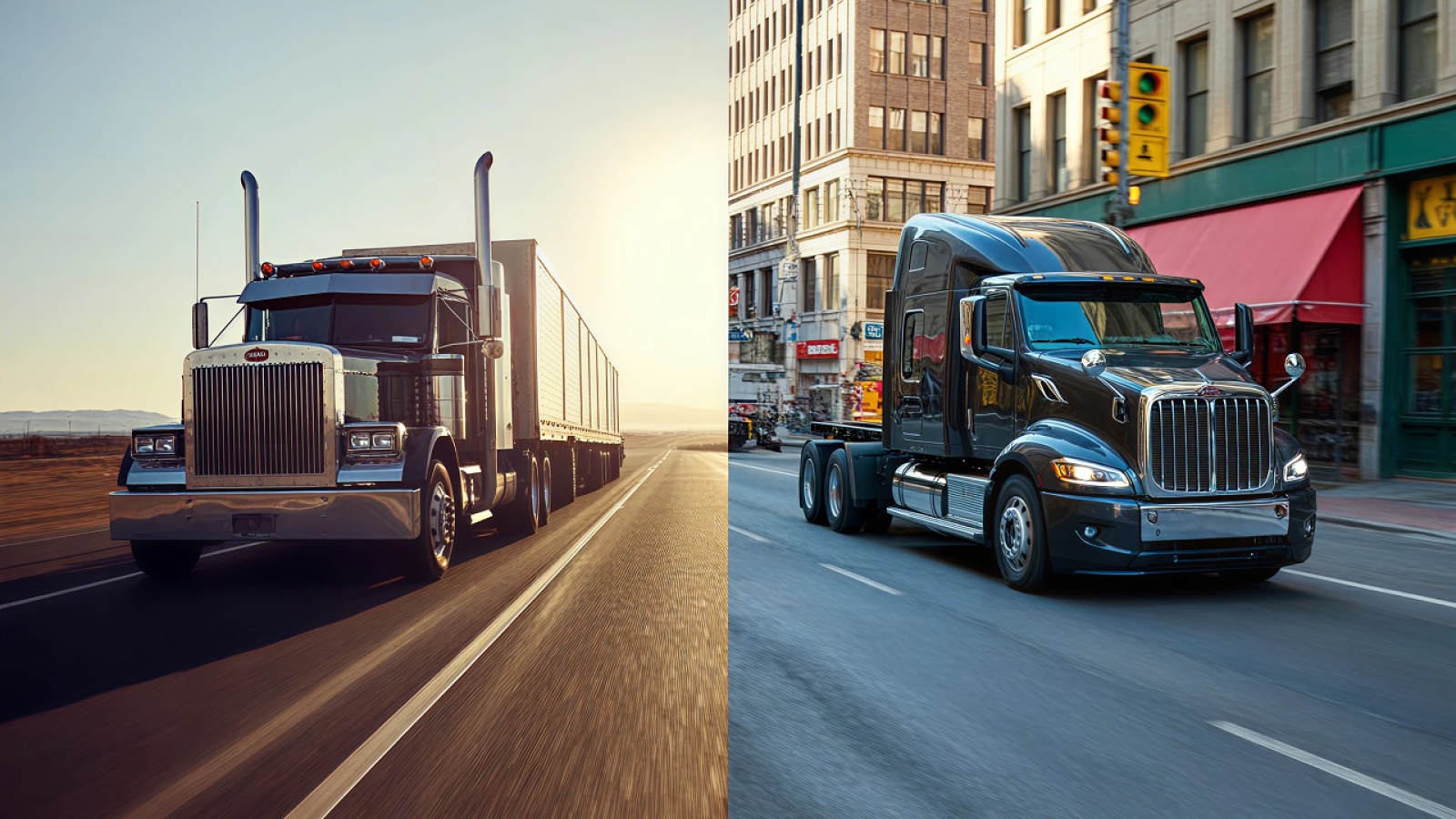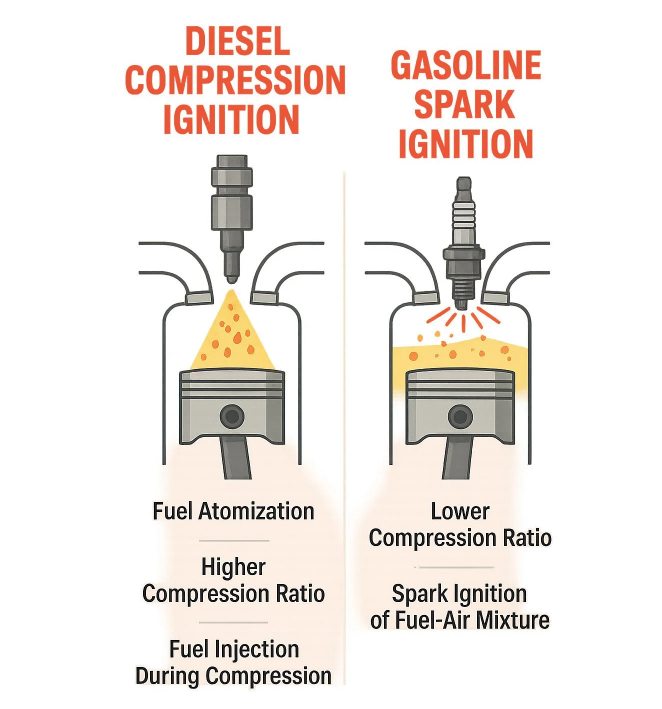Diesel vs Gas Trucks in 2025: What’s Better for Real-World Driving?

If you’re behind the wheel for a living, this question matters. Diesel or gas? It’s not about hype. It’s about finding the truck that fits your route, your load, and the way you drive.
We’ll break it down in plain terms so you can decide what fits your route, load, and budget.
The Basics: Diesel vs Gasoline
Let’s start with how the engines work. Diesel engines use compression to fire up the fuel. Gas engines use spark plugs. That one difference changes how each truck performs: from torque output to engine lifespan.
Diesel burns slower and delivers more low-end power. That makes it ideal for pulling heavy loads and running long distances. Gas burns faster and gives you quicker acceleration, which is better for lighter loads and stop-and-go traffic.
You May Also Like: Eco-Friendly Hauling: Top Brands to Keep An Eye On

That’s why diesel trucks are built for strength and endurance, while gas trucks are better suited for speed and flexibility.
Towing Power and Performance
If you’re pulling trailers, equipment, or anything heavy, diesel trucks are built for that kind of work. They produce more torque at lower RPMs, which means they can move weight without needing to rev high. That’s why diesel is better than gas when it comes to towing.
Gas trucks have more horsepower and faster throttle response. That makes them better for city driving, short trips, and lighter loads. But when it comes to raw pulling power, diesel engines are stronger than gas engines. Diesel trucks are better than gas trucks for hauling up hills, pulling fifth wheels, or moving freight.
If your work depends on towing performance, diesel gives you the edge.
Fuel Efficiency and Mileage
Fuel economy matters, especially when you're logging serious miles. Diesel engines burn fuel more slowly and perform better under load. That makes them more efficient than gas engines on long hauls and highway runs.
In 2025, diesel trucks like the Silverado 1500 Diesel can hit up to 33 miles per gallon on the highway. Most gas trucks fall between 16 and 25 MPG unless they’re hybrids. And when towing or hauling, diesel mileage stays steady. Gas mileage tends to drop fast under pressure.
If you're driving long distances or pulling heavy loads, diesel will stretch your fuel further and save you more over time. For short trips or mixed driving, gas might still be the better fit.
Cost of Ownership
Buying a truck is just the start. You’ve got fuel, maintenance, and repairs to think about. Diesel trucks cost more up front: usually $7,000 to $10,000 more than gas models. They also need DEF fluid, emissions systems, and specialized repairs that can get expensive.
Fuel prices matter too. In 2025, diesel averaged around $4.25 per gallon. Regular gas was closer to $3.60. Diesel gives you better mileage, but it costs more at the pump and in the shop.
Gas trucks burn more fuel, but they’re simpler and cheaper to maintain. You might spend more on fuel, but you’ll likely save on repairs and upkeep.
So the total cost depends on how you drive, how far you go, and what kind of work the truck does.
Maintenance and Reliability
Diesel engines are built to take a beating. They’re designed for long hours, heavy loads, and tough conditions. That’s why diesel trucks tend to last longer than gas trucks when properly maintained. It’s not uncommon for a diesel truck to push past 300,000 miles. Gas trucks usually tap out closer to 200,000.
Diesel fuel itself holds up better in storage. It’s more stable than regular gasoline, which means it doesn’t break down as quickly over time. That matters if your truck sits for stretches between jobs or runs seasonally. Diesel fuel lasts longer than gas, both in the tank and on the shelf.
When it comes to truck lifespan and engine strength, diesel wins. These engines are built for endurance and can handle more wear and tear over the years. But that durability comes with a tradeoff. Diesel trucks cost more to maintain. You’ve got DEF systems, turbochargers, and emissions filters that need regular attention. Repairs can be pricey, and downtime from emissions-related issues is more common.
Gas trucks are easier to live with day to day. They’re simpler to work on, cheaper to fix, and less likely to throw expensive repair bills your way. If you’re looking for ease of use and lower maintenance costs, gas has the edge.
Daily Driving and Mixed Use
Not every truck is out there pulling 20,000 pounds. If you’re using your truck for errands, commuting, or light-duty work, gas might be the better fit. Gas trucks are easier to live with day to day. They start faster in cold weather, warm up quicker, and don’t need as much emissions maintenance.
Diesel vs gas truck daily driver comparisons usually favor gas. Gas trucks are more forgiving for short trips and stop-and-go traffic. Diesel trucks can struggle with cold starts, clogged filters, and downtime from emissions systems.
Diesel is better than gasoline for long hauls and heavy loads. Gas is better for short trips, lower costs, and everyday use. A diesel or gas truck for a daily driver depends on how you use the truck. If you’re not towing often, gas is usually the better choice.
Here’s how diesel and gas stack up in different situations.
You May Also Like: Reefer vs Dry Van: Which Trailer is Best for Your Trucking Business?

The difference between diesel and gas trucks becomes clear when you look at how they perform in real-world conditions.
Gas or diesel truck decisions depend on your route, your load, and your priorities. Diesel is better for long miles and heavy loads. Gas is better for mixed driving and has lower costs. The difference between diesel and gasoline engines affects every part of truck ownership, from the pump to the repair shop.
Every mile, every load, every dollar counts. Pick the truck that’s right for your road ahead.












